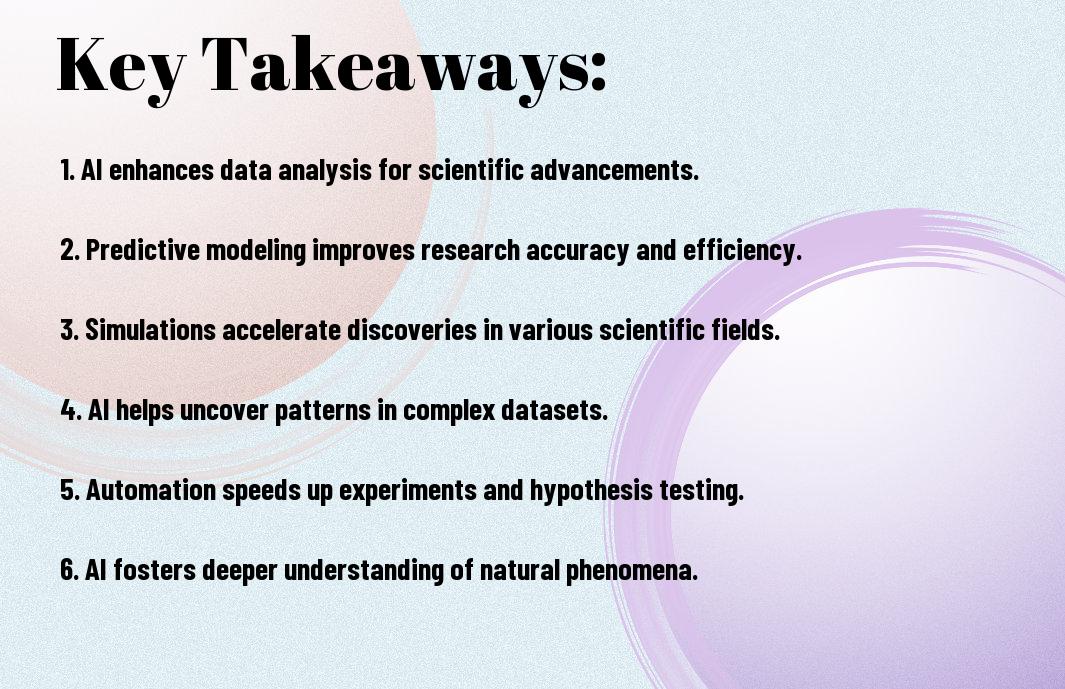AI is playing a crucial role in scientific research
Many scientific fields are benefiting from AI’s ability to process vast amounts of data with unmatched efficiency. With advanced algorithms, you can conduct complex simulations, enhance predictive modeling, and accelerate discoveries. AI improves the accuracy of research, reducing errors and enhancing reliability. In areas like medicine and climate science, its impact is transformative, leading to life-saving advancements and more precise forecasts. However, challenges such as biases in AI models and ethical concerns demand careful oversight. By integrating AI responsibly, you can unlock groundbreaking innovations while mitigating potential risks in scientific exploration.
Key Takeaways:
- AI enhances data analysis, making it easier to process large datasets efficiently.
- Advanced simulations powered by AI help scientists model complex systems with greater accuracy.
- Predictive modeling using AI accelerates discoveries and improves decision-making in research.
- AI-driven automation reduces the time required for experiments and data interpretation.
- Integrating AI into scientific endeavors leads to deeper insights and more precise outcomes.
Foundations of AI in Scientific Research
Before AI became widely integrated into scientific research, analyzing vast amounts of data, running complex simulations, and making accurate predictions required extensive time and manual effort. Traditional methods often limited the pace of discoveries due to constraints in computational power and human capability. Today, AI has transformed scientific inquiry by automating data processing and improving predictive models, enabling researchers to explore phenomena that were previously too complex or time-consuming to study effectively.
With advancements in AI, you now have access to tools that accelerate research breakthroughs. From physics to bioinformatics, AI enhances analytical precision, enabling deeper insights into intricate systems. By significantly reducing the margin of error in simulations and predictive modeling, AI not only speeds up research but also enhances the reliability of scientific findings. This technological shift is reshaping the way discoveries are made, paving the way for new innovations in various fields.
Machine Learning Algorithms in Research
Learning from vast datasets and recognizing patterns is a key strength of AI in scientific research. Machine learning algorithms process enormous amounts of information far more efficiently than traditional statistical methods. In fields like genomics, for instance, AI can analyze human DNA sequences within minutes, identifying genes associated with diseases and accelerating the development of targeted treatments. This level of computational efficiency allows researchers to extract meaningful insights from complex data in ways that were not possible before.
By using machine learning, you can enhance the accuracy of scientific models and improve decision-making in research. AI-driven models assist in climate science, predicting environmental changes with greater precision. In drug discovery, machine learning accelerates the identification of potential compounds for new medications, reducing the time required to bring new treatments to market. The ability of AI to refine massive datasets and detect intricate patterns provides scientists with a powerful tool to push the boundaries of knowledge.
Neural Networks and Deep Learning Applications
Research in deep learning has led to significant advancements across scientific disciplines. Deep neural networks, inspired by the structure of the human brain, are particularly effective at processing unstructured data such as images, signals, and text. In medical imaging, for example, AI-powered neural networks can detect abnormalities in scans with higher accuracy than human experts, enabling earlier diagnosis and improved treatment decisions. This ability to rapidly interpret complex data enhances scientific understanding and practical applications in healthcare.
In physics, deep learning aids in particle simulations and the discovery of new materials, while in astronomy, AI helps process vast amounts of data from telescopes to identify new celestial bodies. These networks not only automate tedious analytical tasks but also reveal patterns that might otherwise go unnoticed. With deep learning, you can explore scientific questions in unprecedented ways, making the research process both more efficient and expansive in scope.
Understanding the potential and risks of deep learning is vital in scientific research. While AI greatly enhances precision, reliance on poorly trained models or biased datasets can lead to inaccurate conclusions. Ensuring rigorous validation and ethical AI use is critical to maintaining the integrity of scientific discoveries. By adopting best practices in AI, researchers can take full advantage of deep learning while minimizing its potential risks.
Data Analysis and Processing
Assuming you are engaged in scientific research, AI-driven data analysis can significantly enhance your ability to extract valuable insights. With vast amounts of experimental and observational data being generated daily, AI-powered algorithms enable you to process and analyze datasets with unprecedented speed and precision. This reduces human error and ensures that patterns, correlations, and anomalies are detected efficiently, helping you draw accurate conclusions. By automating repetitive tasks, AI allows you to focus on interpreting results rather than getting bogged down by computational complexities.
In addition to improving efficiency, AI-driven data processing facilitates large-scale simulations and predictive modeling. Whether you're investigating climate change, genomic sequences, or pharmaceutical compounds, machine learning algorithms assist in making highly reliable predictions based on existing data. AI not only accelerates discoveries but also enhances confidence in findings, leading to a deeper understanding of scientific phenomena. By integrating AI into your research workflow, you can optimize your methodologies and push the boundaries of innovation.
Big Data Management in Scientific Studies
Data in scientific research continues to expand at an exponential rate, making traditional methods of storage, retrieval, and processing increasingly inefficient. AI offers advanced solutions to manage and analyze enormous datasets in fields such as genomics, astrophysics, and environmental science. Through deep learning techniques and automated data categorization, AI systematically organizes vast amounts of information, allowing you to access and interpret critical data points with ease.
By leveraging AI tools, you can efficiently clean, structure, and integrate vast datasets from various sources. This ensures consistency and reliability in scientific findings while enabling cross-disciplinary collaboration. Moreover, real-time processing capabilities allow you to analyze dynamic datasets, such as those from telescopes or particle accelerators. As data-driven research becomes increasingly complex, AI ensures that your ability to manage and utilize large-scale datasets keeps pace with the growing demands of modern science.
Pattern Recognition and Anomaly Detection
To advance scientific discoveries, identifying patterns within complex datasets is crucial. AI excels in recognizing trends that might be imperceptible to human researchers, allowing you to uncover hidden relationships in data. In fields such as medical diagnostics and materials science, machine learning algorithms detect subtle correlations that lead to groundbreaking insights. By continuously refining its models based on new information, AI enhances accuracy and speeds up the discovery process.
Beyond pattern recognition, AI is invaluable for identifying anomalies, which are often key to new scientific breakthroughs. Whether detecting irregularities in astronomical data or flaws in chemical compounds, anomaly detection algorithms help you pinpoint unexpected deviations that may indicate errors or novel phenomena. This capability not only improves the quality of research but also minimizes costly mistakes in experimental studies.
At the forefront of anomaly detection, AI is becoming indispensable in high-stakes research environments. In sectors like cybersecurity and biomedical studies, AI systems track deviations in real-time, ensuring that potential threats or critical discoveries do not go unnoticed. By integrating AI into your research process, you safeguard the integrity of your data while accelerating the pace of meaningful discoveries.
AI-Driven Experimental Design
Unlike traditional experimental design, which often relies on trial-and-error methods, AI enables you to develop highly efficient and data-driven experiments. By leveraging machine learning algorithms, you can analyze vast datasets, identify intricate patterns, and generate testable hypotheses with greater accuracy. This approach does not just speed up research—it enhances the precision of each experiment, reducing wasted resources and improving reproducibility.
With AI-powered design, you can simulate potential outcomes before conducting real-world experiments, significantly reducing time and costs. Advanced predictive modeling tools allow you to refine experimental conditions dynamically, ensuring that each iteration yields valuable insights. This capability is particularly beneficial in fields like drug discovery, where AI has expedited the identification of new therapeutic compounds and their optimal formulations.
Optimization of Research Parameters
On many occasions, refining research parameters can be labor-intensive and time-consuming, but AI transforms this process by analyzing multiple variables simultaneously. Through sophisticated algorithms, AI optimally adjusts experimental conditions, helping you find the most effective balance of variables in a much shorter period. Whether working with chemical reactions, genetic sequences, or material compositions, AI enhances the efficiency of parameter selection.
Beyond efficiency, AI-powered optimization improves the accuracy and reliability of scientific experiments. Unlike human-led adjustments, which may involve biases or inconsistencies, AI can continuously refine parameters based on real-time data, ensuring your research remains both data-driven and reproducible. This dynamic adjustment is highly valuable in physics, chemistry, and environmental sciences, where precise conditions directly impact results.
Automated Laboratory Processes
Experimental workflows can often be bottlenecked by repetitive manual tasks, but AI is transforming laboratory environments through automation. AI-driven systems, combined with robotics, can execute complex procedures with unmatched precision, reducing the risk of human error. Whether handling sample preparations, running assays, or monitoring reactions, automation accelerates your research without compromising accuracy.
Additionally, AI-based systems enable autonomous data collection and analysis, allowing you to process large volumes of information without constant supervision. This technology is particularly impactful in genomics and biomedical research, where AI-powered labs can conduct high-throughput screenings, rapidly sifting through molecular data to identify trends and anomalies that might otherwise be overlooked.
With automated laboratories, your workflow becomes more efficient, enabling you to focus on high-level problem-solving instead of routine procedures. Studies have shown that AI-driven lab automation can increase experimental productivity by up to tenfold, dramatically accelerating discoveries in pharmaceuticals, materials science, and energy research. This level of efficiency means you can achieve deeper scientific insights while significantly reducing time and resource expenditure.
Predictive Modeling and Simulation
All scientific disciplines benefit from AI-driven predictive modeling and simulation, significantly enhancing data analysis, hypothesis testing, and discovery processes. With AI, you can process vast amounts of information to identify patterns and relationships that may not be immediately apparent. This capability accelerates breakthroughs in fields like medicine, physics, and environmental science, allowing researchers to test hypotheses without the constraints of traditional experimentation.
AI-powered simulations provide a deeper understanding of complex scientific systems by recreating real-world scenarios in a virtual environment. This not only reduces the cost and time required for experimentation but also enhances the accuracy of predictions. By minimizing errors and refining models through machine learning algorithms, these simulations contribute to more reliable and impactful research findings.
Complex Systems Modeling
Across various scientific domains, AI helps model intricate systems that were once difficult to understand. Whether it's climate models, human genetics, or molecular interactions, artificial intelligence can analyze and identify patterns in data that would take humans years to process. These advancements help you explore interconnected variables and discover previously unknown relationships in systems where small changes can have significant consequences.
The application of AI in studying complex systems has bolstered fields such as neuroscience and biotechnology, where understanding minute interactions is imperative. By using AI-driven models, you can simulate how diseases progress or how ecological systems respond to environmental changes. Such predictive capabilities guide real-world decision-making, equipping scientists with the data needed to prevent adverse outcomes and propose effective solutions.
Scientific Forecasting and Prediction
About forecasting scientific phenomena, AI has transformed how you predict events, making projections more accurate and efficient. In meteorology, for instance, AI-driven models analyze large climate datasets to provide more reliable weather forecasts, helping mitigate the impact of severe storms or natural disasters before they occur. Similarly, in epidemiology, AI tools help track disease outbreaks by analyzing millions of data points in real time, enabling early intervention strategies.
Beyond natural sciences, AI enhances predictive accuracy in fields such as astrophysics and chemistry. By leveraging machine learning, you can now anticipate planetary movements, material reactions, and even potential medical advancements. The rapid evolution of AI in prediction reduces uncertainty in scientific research, allowing for more refined experimentation and theoretical development.
And with AI continuously learning from new datasets, its accuracy in scientific predictions improves over time. This iterative refinement benefits industries dependent on precise forecasting, such as agriculture, finance, and energy. In the face of global challenges like climate change and pandemics, the ability to rely on AI-driven predictions means quicker responses and better-prepared solutions, strengthening your approach to scientific research and real-world problem-solving.
AI in Various Scientific Fields
Now, artificial intelligence is transforming multiple scientific disciplines by enhancing the speed and accuracy of research. By leveraging advanced data processing, predictive modeling, and simulations, AI enables you to analyze vast datasets efficiently, leading to groundbreaking insights. Whether in life sciences, physics, chemistry, or environmental research, AI's ability to recognize patterns and make predictions accelerates scientific progress.
Through sophisticated machine learning algorithms, AI aids in formulating hypotheses, optimizing laboratory experiments, and improving data interpretation. This technology allows researchers like you to focus on innovation rather than spending excessive time on data processing. AI's impact spans from identifying new drug compounds to modeling complex physical interactions, paving the way for discoveries that were previously unimaginable.
Applications in Life Sciences and Medicine
Among the most transformative applications of AI is its role in life sciences and medicine, where it has reshaped diagnostics, drug discovery, and treatment strategies. AI-driven models analyze medical images, helping to identify diseases such as cancer with unprecedented accuracy. Additionally, AI-powered predictive analytics can detect patterns in genetic data, assisting in the development of personalized medicine tailored to individual patients.
By significantly reducing the time required for drug discovery, AI accelerates the identification of potential treatments. For example, AI screening algorithms enable you to quickly evaluate existing drugs for new therapeutic applications. This rapid analysis not only expedites medical breakthroughs but also enhances patient outcomes, ensuring that cutting-edge treatments reach those in need faster than ever before.
AI in Physics and Chemistry Research
Sciences like physics and chemistry benefit greatly from AI's ability to process immense amounts of data and simulate intricate experiments with high precision. In physics, AI helps you model quantum systems, predict material properties, and optimize complex simulations. This capability leads to faster discoveries in areas such as superconductors, nuclear fusion, and nanotechnology. Similarly, in chemistry, AI accelerates molecular modeling, helping researchers design new materials and chemical compounds with desired properties.
By automating tedious data analysis tasks and conducting simulations that would take years using traditional methods, AI enables you to explore uncharted scientific territories. From predicting reaction mechanisms to optimizing catalysts for sustainable energy, AI strengthens the foundation of future innovations, ensuring that knowledge progresses at an unparalleled pace.
Scientific advancements in both physics and chemistry rely on your ability to process complex datasets and extract meaningful insights. With AI-enhanced research tools, you can reduce experimental errors and enhance the reproducibility of scientific findings. Moreover, AI-driven automation enables the discovery of novel materials for applications ranging from drug synthesis to renewable energy solutions. In this way, AI ensures that progress in these fields continues to evolve, providing a deeper understanding of the physical and chemical interactions underlying the world around you.
Challenges and Limitations
For all its advancements, AI in scientific research comes with significant challenges and limitations. One major concern is the potential for biases in AI models, which can influence results and lead to incorrect conclusions. The accuracy of AI-driven research heavily depends on the quality and diversity of training data. If data is incomplete or skewed, the outcomes may reflect those flaws, affecting scientific reliability. Additionally, interpretability remains a problem—many AI systems function as "black boxes," making it difficult for researchers to understand how they arrive at conclusions. This lack of transparency can slow adoption in critical fields like medicine and environmental science. More insights on these concerns can be explored in The Potential and Concerns of Using AI in Scientific ....
Another limitation is that AI models require extensive human oversight. While these systems can automate many aspects of research, they still depend on expert validation to ensure findings are legitimate. Incorrect models or faulty algorithms could mislead entire studies, wasting time and resources. Furthermore, regulatory delays pose a challenge—many scientific fields require strict validation of AI methodologies before they can be widely adopted. These obstacles highlight why AI must be implemented carefully and with well-defined ethical and operational guidelines.
Technical Barriers and Computing Requirements
The technical demands of AI-driven scientific research are substantial. Training and running advanced AI models require powerful computing resources, often exceeding what traditional research institutions can support. High-performance GPUs, cloud computing, and specialized software are necessary for handling vast datasets and performing complex simulations. Without access to sufficient infrastructure, smaller research teams may find it difficult to leverage AI effectively, creating a gap between large, well-funded institutions and smaller organizations.
Additionally, AI algorithms consume enormous amounts of energy—a factor that has raised concerns about sustainability. Some of the most advanced machine learning models, such as deep neural networks, require extensive training cycles, leading to high carbon emissions. These energy demands can quickly become a limiting factor, particularly in regions with limited computational resources or high electricity costs. Finding ways to optimize AI efficiency without compromising its effectiveness remains a key challenge in scientific innovation.
Ethical Considerations and Data Privacy
Computing advancements in AI-driven research also bring concerns regarding data privacy and ethical implications. AI models rely heavily on large datasets, often containing sensitive information, including patient records in medical research or confidential data in environmental studies. If these datasets are not properly secured, they risk exposure to cyber threats or misuse. Furthermore, AI models trained on biased data may reinforce societal inequalities, potentially leading to discriminatory outcomes in critical fields such as genetics, drug discovery, and epidemiology.
In addition, ensuring fair access to AI tools is an ongoing issue. Currently, the development of AI in research is dominated by well-funded institutions and private companies, raising concerns about accessibility and monopolization. If only certain entities control AI-driven breakthroughs, scientific progress could become concentrated in the hands of a few, limiting global innovation. Establishing clear ethical guidelines and promoting transparency in AI-assisted research will be vital to avoiding these risks and fostering equitable collaboration across the scientific community.

Final Words
Hence, as you explore the evolving landscape of scientific research, it becomes evident that AI is reshaping the way discoveries are made. By enabling advanced data analysis, predictive modeling, and complex simulations, AI enhances the efficiency and precision of research across various disciplines. Whether in medicine, physics, or environmental science, AI-driven tools allow you to analyze vast amounts of data faster than ever, accelerating breakthroughs that were once thought to take decades.
AI is not simply a tool but a transformative force that strengthens your ability to gain deeper insights into intricate phenomena. Its continuous advancements mean that future research will likely depend even more on intelligent systems for hypothesis generation, experimentation, and validation. To better understand the impact AI has on modern research methodologies, explore How AI Is Shaping Scientific Discovery. As AI continues to evolve, it offers you unprecedented opportunities to push the boundaries of knowledge and innovation.








